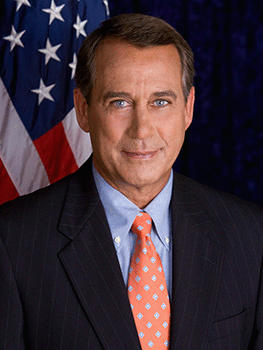Shutdown Looms in Washington Amid Political Deadlock
September 30, 2013
A shutdown of the U.S. federal government looms, as Democratic and Republican lawmakers remain deadlocked over stopgap legislation to fund government operations. Without passage of a finance bill by both houses of Congress, the government will be forced to close all nonessential federal services at midnight on October 1.

Speaker of the House of Representatives, John Boehner (above), leads a Republican Party intent upon tying the U.S. budget bill to delaying or denying funding to the Affordable Healthcare Act, passed in 2010. Senate Majority leader Harry Reid (above left) has vowed that the Senate will not vote for the House's version of the finance bill (United States House of Representatives).

(U.S. Senate)
The key point of contention in the political stalemate is the Affordable Care Act, President Barack Obama’s landmark health care legislation. A number of Republicans in the House of Representatives—in particular the Tea Party caucus—demand that the law be repealed or stripped of funding as a condition for keeping the government running. The House passed its latest version of a stopgap funding measure on September 28. The bill included a year-long delay in the implementation of what has come to be called “Obamacare.” It also included a measure that would permanently eliminate a medical-device tax that was designed to partially fund the new health care system. Legal experts point out that eliminating the tax would essentially cripple the act. Senate Majority leader Harry Reid has vowed that his Democrat-led chamber will reject the House bill, and in fact, the Senate failed to go into session on September 29 despite the political crisis.
A government shutdown would place more than 700,000 federal employees on unpaid leave, with no guarantee of receiving back pay once the deadlock is over; Social Security, federal pension, and veterans’ benefit checks would be delayed; Medicare and Medicaid payments would be disrupted; and many government facilities, including immigration services and passport and visa offices, would be shut down; the national parks and Smithsonian museums would also close.
President Obama emphasized today that the simple solution to the standoff is for House Republicans to pass the budget that was passed by the Senate on September 27. Of course, the Senate legislation does not gut the Affordable Care Act. Political experts note that the Senate bill, if brought to the House floor by Speaker John Boehner, would almost certainly pass, largely with Democratic votes. However, they suggest that if Boehner were to bring the Senate bill to a vote in defiance of the Tea Party caucus his action would likely cost him his position as speaker of the House.
Major portions of the Affordable Care Act, which a Democrat-controlled Congress passed in 2010, are due to go into effect tomorrow. The U.S. Supreme Court ruled that the act was constitutional in 2012.
Additional World Book articles:
- Congress of the United States 2010 (a Back in Time article)
- Health Care Reform–What’s in it for You? (a special report)
- Medicaid in Distress (a special report)
- Tempest in a Tea Party (a special report)


